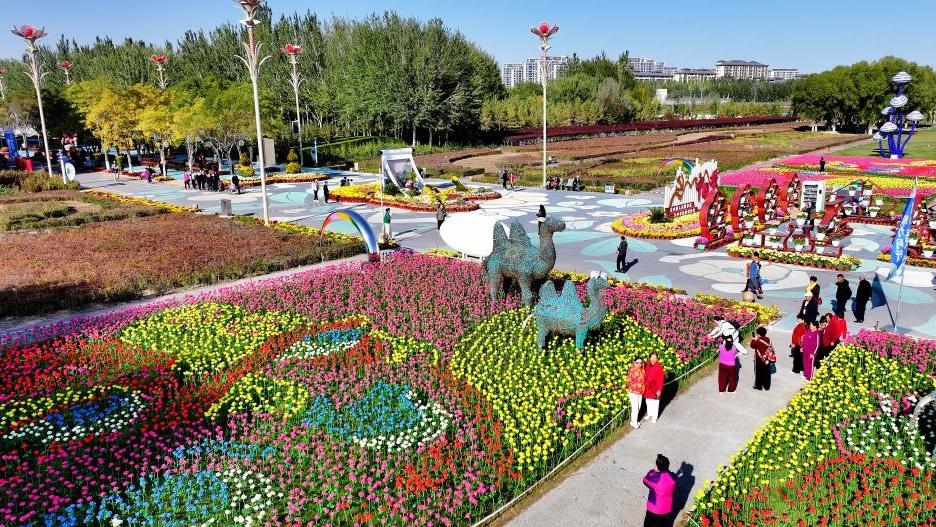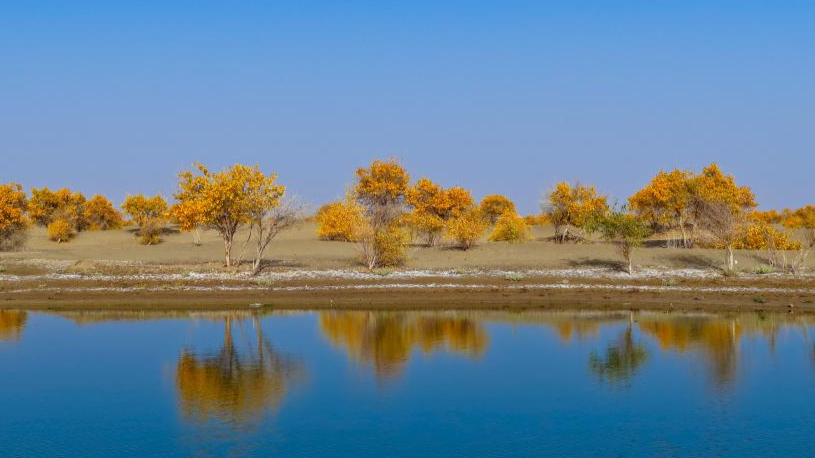Descendants commemorate Chinese people’s heroism and transnational anti-fascism spirit embodied in Weihsien concentration camp rescue during WWII
Editor's Note:
This year marks the 80th anniversary of the victory in the Chinese People's War of Resistance against Japanese Aggression (1931-45) and the World Anti-Fascist War. Winning the war is a great victory of the national spirit with patriotism at its core, a great victory achieved with the Communist Party of China (CPC) fighting as the central pillar, a great victory fought by the whole nation through solidarity and bravery, and a great victory for the Chinese people, anti-fascist allies and people around the world who fought shoulder-to-shoulder.
To commemorate this historic milestone and its lasting impact, the Global Times has launched a themed series revisiting the great significance of the victory through three lenses: The "Guardians of Memory," the "Witnesses of Struggle," and the "Practitioners of Peace." It underscores the importance of "learning from history to build together a brighter future."
This is the fourth "Practitioners of Peace" installment, focusing on the Weihsien West Civilians Concentration Camp Site Museum, in Weifang, East China's Shandong Province, and a segment of World War II (WWII) history in which a number of ordinary Chinese people risked their lives to help the foreign expatriates detained by the Japanese military. It is a powerful testament of Chinese and foreign people's unyielding solidarity and courageous resistance amid adversity in the global fight against fascism, and a tangible form to this luminous chapter of humanity.
In a 140-year-old cross-shaped building, with its red roof and cyan-colored walls, in Weifang, East China's Shandong Province, two walls display nearly 50 golden handprints, each inscribed with an English name, and some also having a Chinese name.
These handprints commemorate a specific wartime event: From March 1942 to August 1945, during the Chinese People's War of Resistance against Japanese Aggression and World Anti-Fascist War, many local Chinese civilians risked their lives to breach Japanese military blockades, delivering messages and providing food as well as medical supplies to over 2,000 expatriates detained by Japanese invaders in the Weihsien concentration camp in Shandong. Some even made the ultimate sacrifice, losing their lives in these courageous acts.
The 83-year-old Charles A Stanley is one of the surviving expatriates, interned with his parents at the camp as a baby. After being released, he returned to Weifang in 1991, bringing his family with him, maintaining their "long-lasting friendly connections" with China.
His son, John Stanley, told the Global Times that from his grandfather's recollections, he could feel that without the help from the local Chinese villagers, the internees stuck in the camp would have found it much harder to sustain themselves.
On August 17, Charles Stanley came back again, paying a visit to the Weihsien West Civilians Concentration Camp Site Museum, and participated in the "International Forum on Concentration Camps in Asia during WWII: History, Memory and Cultural Heritage."
Standing before the monument erected on the square commemorating peace, Charles Stanley gazed intently at its surface, with trembling hands skimming across the stone surface, searching through the densely carved names until he found traces of himself and his parents. "It has been 80 years, with these names remaining, our story lives on," he told the media, hastily holding up his phone to take a photo.
Ayo Ayoola-Amale, vice chair of International Cities of Peace who also participated in the international forum in August, stated that remembering the suffering is not about prolonging hatred, but about kindling a beacon of hope for the future, according to the official Wechat account of the musuem.
Across the high walls
The former site of Weihsien West Civilians Concentration Camp Site Museum was a compound originally built by Americans in 1882, named the "Courtyard of the Happy Way," functioning as a church, hospital, and school.
More than 80 years ago, it witnessed a prolonged imprisonment of hunger, coldness, and despair that stretched on for more than two years.
In July, 1937, Japanese troops attacked Chinese forces, marking the beginning of their full-scale invasion of China. As the war situation intensified, Japanese troops converted the "Courtyard of the Happy Way" into a concentration camp, holding more than 2,000 expatriate civilians living in Beijing, Tianjin, Shandong Province, and other places of China to the camp, including over 300 children, from the US, UK, Canada, and other countries from March 1942 to August 1945.
The eldest among them was over 85 years old, while at the same time, there were babies born in the camp.
Charles Stanley learned from his parents that in the concentration camp, people were desperately short of warm clothing and food, suffering from hunger and bitter cold, as reported by Xinhua News Agency.
During those dark days, Chinese villagers managed to offer food to the expatriates, smuggling them into the camp. In return, the internees would take advantage of the guards' inattention and throw their things they have over the walls to the villagers outside, according to media reports.
"My grandparents said that they valued the messages and food sent in secretly by the local population through the Chinese workers in the camp very much," John Stanley shared with the Global Times, noting that those who helped not only brought their grandparents material aid, but also granted them "spiritual uplifting" that most of the internees relied on.
Today, stepping into the compound, one would encounter the "Victory &Friendship" bronze monument standing solemnly in the square. At its base, rows of names from the Weihsien concentration camp internment records are etched in stark white lettering against black granite, their silence heavy with memory.
In the golden bronze relief above, figures are frozen in distinct moments - raising a fist, waving an arm, and sharing a handshake. Their postures differ, but their faces hold the same expression, radiating smiles for victory and friendship.
This precious chapter of history was not destined to be confined by the camp's walls or swallowed up by the waves; it was bound to be known and remembered by more and more people. In 2008, a documentary examining on the Weihsien concentration camp aired on China Central Television. In June 2016, the film The Last Race, set against the backdrop of the Weihsien concentration camp, adapted from the true experiences of local witnesses premiered in China. In November 2017, it premiered in the US.
Iron bed takes record
Recounting this history anew, Han Chongbin's voice still carried a faint tremor, resonant with profound emotion.
As the descendant of the local Chinese villagers participating in rescuing, Han recounted his father's deeds to the Global Times. The vivid images from history began to surface in his mind, visions of events recounted by his elders since childhood.
During war time, Han family's neighbor worked as a cook in the camp. His role in daily procurement allowed him unusual mobility, and through the neighbor, Han's father learned of the dire conditions inside: Internees endured chronic hunger, and some children suffered from severe malnutrition.
One day, Han's father and Tan scraped together what little they could - five kilograms of white sugar, and some eggs. They waited until the guards at camp changed shifts, and used a bamboo pole passed from inside to hoist the bundle over the electrified fence under the cover of darkness.
"Just as my father was about to leave," Han went on to recall, "a voice came from inside, saying, 'Don't go yet - someone wants to give you something,' Moments later, an iron bed, taken apart into three pieces, was hoisted out from inside. My father had never expected any rewards before doing this."
The iron bed - the only item that the internees could offer their rescuers to express their deep gratitude - has now been donated to the museum. It stands as a powerful testament to the solidarity between Chinese and foreign expatriates who supported each other to survive those difficult times. "We have kept it for 76 years. My son slept on it as a child, cherished it so much, and never jumped on it," Han told the Global Times.
Han, now a volunteer guide at the Weihsien West Civilians Concentration Camp Site Museum, often shares the story of helping those expatriates with visitors from around the world, with the largest audience once reaching two to three hundred. He hopes that more young people will learn about that period of history, believing that only by remembering the suffering war inflicted upon humanity can we truly cherish the hard-won peace we enjoy today.
He said that as a descendant of the brave ancestors, he feels both proud and a sense of mission.
"I cherish this legacy, and ensure that the bravery of my father's generation and this precious bond they forged endures. Future generations must carry forward the solidarity forged through adversity by their ancestors and join hands in safeguarding peace," Han told the Global Times.
Peace bond transcends time
The smoke of war has long since dissipated, yet the friendship between Chinese people and foreign expatriates endures.
John Stanley told the Global Times that he would like to convey his gratitude to the descendants of those rescuers for the efforts of their grandparents personally, when he had the opportunity to meet them.
This summer, the Stanley family saw the realization of a dream held by generations. In August this year, 80 years after the camp was liberated, 11 survivors of the camp and their relatives traveled across mountains and seas to Weifang, coming together for a reunion of peace. Emotional scenes unfolded as the descendants of the rescued expatriates and Chinese rescuers met and spoke warmly, with some clasping each other's hands tightly, as if reunited with old friends.
Charles Stanley came face to face with Han during the event, reuniting the descendants of both sides. Han presented Charles with a rosewood cane inlaid with silver, handcrafted by his daughter and engraved with 100 versions of the Chinese character for "longevity," symbolizing wishes for health and long life. Charles took this gift excitedly.
In recognition of the unique wartime bond between over 2,000 Western expatriates and Weifang, and the city's efforts to promote peace through the transformation of the camp site into a museum, Weifang was designated as the world's 308th International City of Peace in 2021.
"The museum is a snapshot of history," Wang Xiaohui, deputy director of the museum said. He said that the museum stands not only as evidence of the suffering inflicted by the aggressors, but also as a vessel of collective memory - bearing witness to how Chinese people and foreign expatriates on the Eastern Front of World War II sought self-redemption and rose in courageous resistance amid adversity. By giving tangible form to this luminous chapter of humanity, it advances a shared global understanding of peace and continues to deepen the bonds of friendship between China and the world.
"The humanitarian spirit of the Chinese rescuers deserves to be celebrated, and this history is one that must always be remembered, to let future generations hear the truth and understand how precious peace truly is," he said.
Photos
Related Stories
- Events held in Taipei to mark 80th anniversary of Taiwan's restoration
- Street names across Taiwan preserve memory of its restoration to China from Japanese occupation
- China resolutely opposes U.S. arms sales to Taiwan: spokesperson
- Mainland willing to strengthen high-level exchanges with Taiwan's KMT: spokesperson
- Mainland spokesperson calls for cross-Strait joint efforts to resist external challenges
- Mainland to invite Taiwan compatriots to commemorate 80th anniversary of Taiwan's restoration
Copyright © 2025 People's Daily Online. All Rights Reserved.









